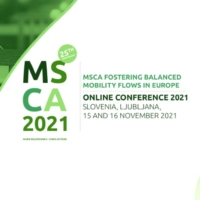COST at MSCA 2021: Addressing political challenges and fostering balanced mobility flows
“Networking and mobility are key to the academic community” Prof. Alain Beretz stated during a session to address balanced mobility flows of researchers.
On the 15 November 2021, President of the COST Association, Prof. Alain Beretz joined the first day of the MSCA 2021 conference, to discuss ‘Addressing Political challenges of MSCA to foster balanced mobility flows.’
“Brain circulation doesn’t lead to brain drain but rather talent flow. Brain circulation is one of the key ways to foster European competitivity and now is the time for research and brain circulation to be at the top of political agendas.”
President of the COST Association, Prof. Alain Beretz
The two-day online event, entitled MSCA Fostering Balanced Mobility Flows in Europe, was organised as part of the Slovenia Presidency of the Council of the EU, with a number of speakers presenting live from Ljubljana. The Presidency conference aimed to highlight the problem of unbalanced brain circulation, as well as contribute to the realisation of the new ERA – a common scientific and technological area for the EU and single market for research and innovation.
The Conference looked at the issue of return migration and reintegration processes of MSCA researchers to their countries of origin after the completion of their scholarships. It also showcased examples of existing good practices, barriers, instrument, and policies that promote return migration, bringing skills and knowledge back to country of origin. Finally, the event aimed to make recommendations for the implementation of MSCA return migration and reintegration instruments and policies at the EU, Member State, research organisation and individual level.
Watch the event here
The role of COST in brain circulation
For over 50 years, COST has made brain circulation a reality. According to empirical analyses and impact assessments of the COST activities, a central long-term effect of COST is the improvement in the circulation of knowledge between the participating research institutions. Through its networking activities, COST provides short-term mobility schemes to researchers and innovators across Europe.
As such, the networking activities of COST promotes brain circulation in Europe by integrating all types of specialists (researchers, innovators, policy makers, civil society) within international networks of excellence. COST Actions provide researchers an opportunity to return and continue their research careers at the home, in their country of origin, or establish long-term cooperation between institutions. Every year, numerous COST Activities are organised in all the COST countries.
Successful talent flow: COST Action EU-ROS
Dr Lars-Oliver Klotz was a Professor in Pharmaceutical Sciences at the University of Alberta, Canada and moved to Germany to take his current position as a Professor in Nutrigenomics at the University of Jena (Friedrich Schiller University) in late 2013.
Working with the COST Action “EU-ROS” helped him transition from one side of the world to the other with ease. “Whenever you start out in a new place, a major issue is of course to get connected and to find collaboration partners,” he says. “My COST Action was a life-saver in that respect.”
Taking part in this COST Action enabled him to present his research to the members of the Action and get to know researchers from his field of interest, the research on reactive oxygen species/free radicals and their impact on different aspects of metabolism. More information on this COST Action can be found here.
About Marie Sklodowska – Currie Actions
The Marie Skłodowska-Curie Actions fund excellent research and innovation and equip researchers at all stages of their career with new knowledge and skills, through mobility across borders and exposure to different sectors and disciplines. The MSCA help build Europe’s capacity for research and innovation by investing in the long-term careers of excellent researchers.
The MSCA also fund the development of excellent doctoral and postdoctoral training programmes and collaborative research projects worldwide. By doing so, they achieve a structuring impact on higher education institutions, research centres and non-academic organisations.
The MSCA promote excellence and set standards for high-quality researcher education and training in line with the European Charter for Researchers and the Code of Conduct for the recruitment of researchers.
Further information
